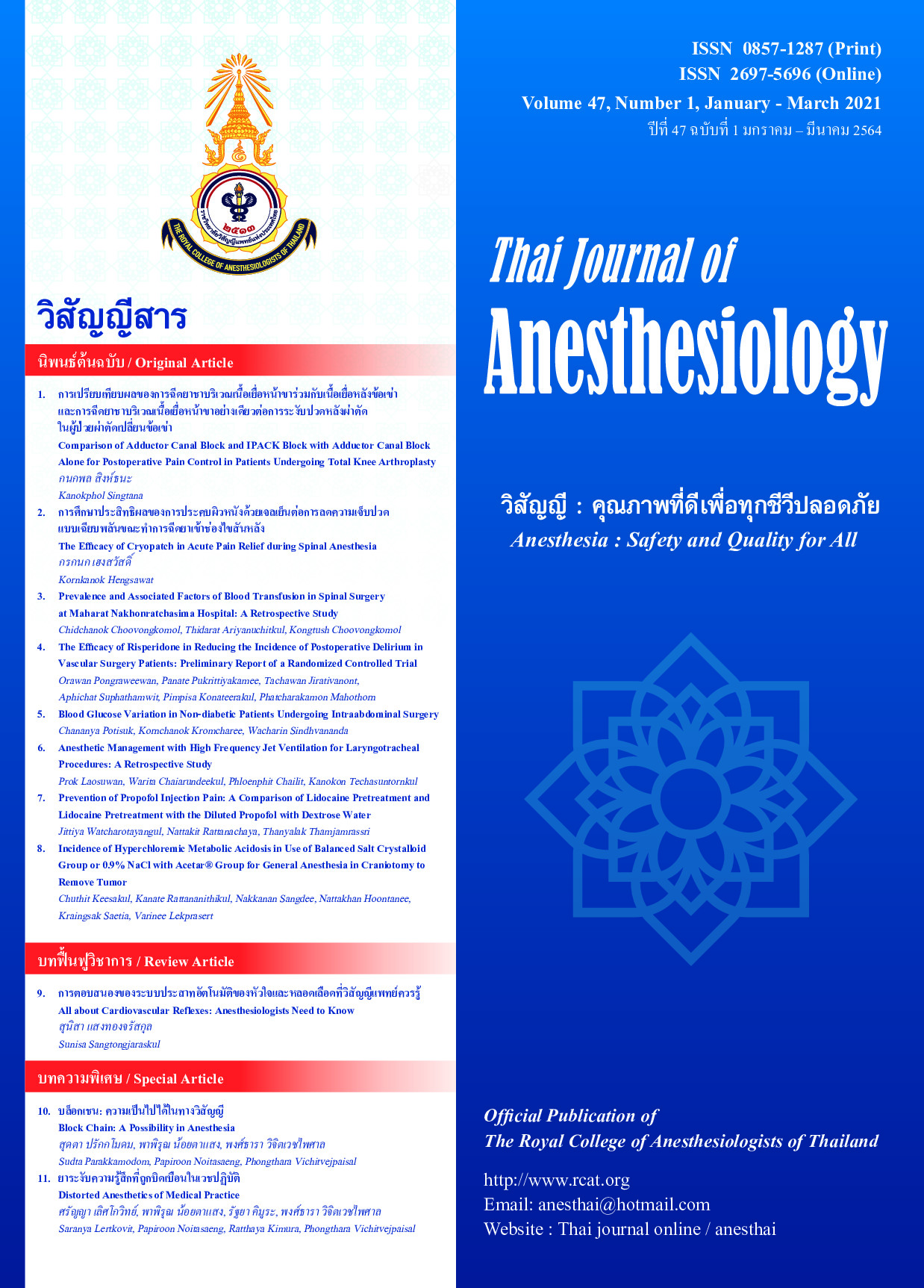The Efficacy of Risperidone in Reducing the Incidence of Postoperative Delirium in Vascular Surgery Patients: Preliminary Report of a Randomized Controlled Trial
Main Article Content
บทคัดย่อ
Objective: Postoperative delirium (POD) increases
postoperative morbidity, mortality, and health care costs.
POD has many risk factors, such as old age, preoperative
cognitive impairment, alcohol abuse, malnutrition, multiple
comorbidities, and vascular disease. Risperidone has
been reported as effective in POD prevention and
treatment. This study investigated the effectiveness of
risperidone in reducing the incidence of POD in vascular
patients.
Materials and Methods: Patients undergoing vascular
surgery were assigned randomly to two groups. Those in
the risperidone group received sublingual disintegrating
risperidone (1 mg) within one hour after surgery, while the
placebo-group patients received a sublingual Listerine
strip. All patients were evaluated for POD using the
CAM-ICU twice daily for seven days, with the DSM-5
delirium criteria being used to confirm POD by a
psychiatrist blinded to the group allocations. The possible
risk factors for POD were recorded. Results: The study unfortunately needed to be terminated
early as supplies of orally disintegrating risperidone
became unavailable in Thailand. Of the 35 participating
vascular surgery patients, 17 were in the risperidone
group, and 18 in the control. One patient (5.6%) in the
former group and one individual (5.9%) in the latter were
diagnosed with POD. The overall POD incidence was
5.7%. The groups demonstrated no statistically significant
differences in baseline characteristics, possible risk
factors, or lengths of hospital stay.
Conclusion: The study could not demonstrate the impact
of orally disintegrating risperidone (1 mg) on the incidence
of POD among vascular-surgery patients due to the very
low incidence and inadequate sample size.
Article Details
เอกสารอ้างอิง
surgery. Eur J Vasc Endovasc Surg 2011;42:831-2.
2. Bohner H, Hummel TC, Habel U, et al. Predicting delirium
after vascular surgery: a model based on pre- and intraoperative
data. AnnSurg 2003;238:149-56.
3. Sasajima Y, Sasajima T, Uchida H, et al. Postoperative
delirium in patients with chronic lower limb ischaemia: what
are the specific markers? Eur J Vasc Endovasc Surg 2000;
20:132-7.
4. Schneider F, Bohner H, Habel U, et al. Risk factors for
postoperative delirium in vascular surgery. Gen Hosp
Psychiatry 2002;24:28-34.
5. Witlox J, Eurelings LS, de Jonghe JF, Kalisvaart KJ,
Eikelenboom P, van Gool WA. Delirium in elderly patients
and the risk of postdischarge mortality, institutionalization,
and dementia: a meta-analysis. JAMA 2010;304:443-51.
6. Milbrandt EB, Deppen S, Harrison PL, et al. Costs associated
with delirium in mechanically ventilated patients. Crit Care
Med 2004;32:955-62.
7. Benson RA, Ozdemir BA, Matthews D, Loftus IM. A systematic
review of postoperative cognitive decline following open and
endovascular aortic aneurysm surgery. Ann R Coll Surg Engl
2017;99:97-100.
8. Prakanrattana U, Prapaitrakool S. Efficacy of risperidone for
prevention of postoperative delirium in cardiac surgery.
Anaesth Intensive Care 2007;35:714-9.
9. Raats JW, Steunenberg SL, de Lange DC, van der Laan L.
Risk factors of post-operative delirium after elective vascular
surgery in the elderly: A systematic review. Int J Surg
2016;35:1-6.
10. Leysen JE, Janssen PM, Megens AA, Schotte A. Risperidone:
a novel antipsychotic with balanced serotonin-dopamine
antagonism, receptor occupancy profile, and pharmacologic
activity. J Clin Psychiatry 1994;55 Suppl:5-12.
11. Katznelson R, Djaiani G, Mitsakakis N, et al. Delirium following
vascular surgery: increased incidence with preoperative
beta-blocker administration. Can J Anaesth 2009;56:
793-801.
12. Kallenbach TF, Amado LA. Assessment of delirium in the
intensive care unit. South Afr J Anaesth Analg 2017;23:57-63.
13. Tomasi CD, Grandi C, Salluh J, et al. Comparison of CAM-ICU
and ICDSC for the detection of delirium in critically ill patients
focusing on relevant clinical outcomes. J Crit Care 2012;
27:212-7.
14. Gusmao-Flores D, Salluh JI, Chalhub RA, Quarantini LC. The
confusion assessment method for the intensive care unit
(CAM-ICU) and intensive care delirium screening checklist
(ICDSC) for the diagnosis of delirium: a systematic review
and meta-analysis of clinical studies. Crit Care 2012;16:R115.
15. Neto AS, Nassar AP, Jr., Cardoso SO, et al. Delirium
screening in critically ill patients: a systematic review and
meta-analysis. Crit Care Med 2012;40:1946-51.
16. Ward S, Roberts JP, Resch WJ, Thomas C. When to adjust
the dosing of psychotropics in patients with renal impairment.
Current Psychiatry 2016;15:60-6.


